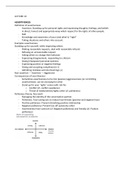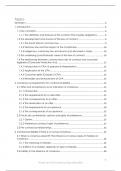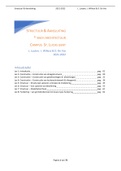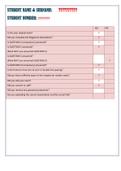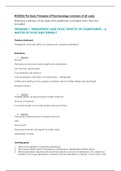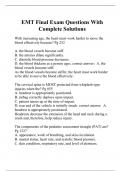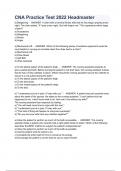LECTURE 10
ASSERTIVENESS
Definition of assertiveness
- Assertion: Standing up for personal rights and expressing thoughts, feelings, and beliefs
in direct, honest and appropriate ways which respect for the rights of other people.
- Skill
- Knowledge and awareness of your (and other’s) “right”
- Taking situations and others into account.
Examples assertiveness
Standing up for yourself, while respecting others:
- Making reasonable requests, deal with reasonable refusals
- Refusing an unreasonable request
- Asking others to change their behavior
- Expressing disagreement, responding to criticism
- Giving (impopular) personal opinions
- Expressing positive or negative feelings
- Giving and accepting compliments (+)
- Admitting mistakes and shortcomings (+)
Non-assertive --- Assertive --- Aggressive
Consequences of assertiveness
- Sometimes assertiveness turns into (passive) aggressiveness (or controlling
assertiveness): can be annoying for other
- Stand up for your ‘rights’ comes with risk for:
o Conflict (cf. conflict avoidance)
o Threat of needs/wishes/rights other (cf. politeness)
Politeness theory; face work
- Managing the identity of the conversation partner.
- Politeness: Face saving acts to reduce face-threats (positive and negative face)
- Positive politeness: Prevent disturbing positive relationship
- Negative politeness: Prevent loss off autonomy other
- Assertiveness=non-coercive (cf. Negative politeness) and friendly (cf. Positive
politeness)
,Styles of responding: verbal behavior
Speech act theory
- Ant utterance is an action with a particular effect.
o Locutionary act
! The actual utterance of words with a specific conventional meaning
(phonetics, syntax, semantics)
o Illocutionary act
! The “force” (action) of an utterance (intended meaning)
! Promise, demand, request
, o Perlocutionary act
! The effect the utterance has on a listener.
! Determined by listener
o Direct versus indirect speech acts
! Direct speech act: Literal force: Literal (locutionary) and intended
(illocutionary) are the same
! Indirect speech act: literal (locutionary) and intended (illocutionary) are
different.
Request to close the door
- “Close the door” (only direct one)
- “Can you close the door?”
- “Would you mind closing the door”
- “It can help to close the door”
- “Did you forget the door?”
- “Do you believe it would have a negative psychological effect on you if you closed the
door?”
- “It’s getting cold in here”
- “I do not want the cats to escape”
- “Where you born in church?”
Indirect language is often more polite, but less clear
- Lower risk for conflict
- Higher risk of misunderstanding
You-language
- You just don’t want to cooperate; you are an anti-social freeloader!”
Better: (I-language)
- Describe behavior (concretely): “The joint assignment of this week, you did not share
your part.”
- Emphatic: “I understand you are really busy” (cf. perspective taking)
- Your reaction: “I find this really unpleasant”
- Request for change “I would really appreciate it if you share your contribution this
week”
- We-language: “Apparently we have different ideas about our collaboration” (the 3rd
story)
Non-assertive:
- Hesitation, very soft voice, gaze aversion
- Avoiding topic, no self-disclosure, not expressing opinion
Assertive
- Clear/ firm tone of voice, eye gaze, controlled gestures, quick responses
- Raise topic, self-disclosure, express opinion
Passive aggressive
- Negative expression. Slamming door with no explanation
- Avoiding topic, indirect (sarcastic)
ASSERTIVENESS
Definition of assertiveness
- Assertion: Standing up for personal rights and expressing thoughts, feelings, and beliefs
in direct, honest and appropriate ways which respect for the rights of other people.
- Skill
- Knowledge and awareness of your (and other’s) “right”
- Taking situations and others into account.
Examples assertiveness
Standing up for yourself, while respecting others:
- Making reasonable requests, deal with reasonable refusals
- Refusing an unreasonable request
- Asking others to change their behavior
- Expressing disagreement, responding to criticism
- Giving (impopular) personal opinions
- Expressing positive or negative feelings
- Giving and accepting compliments (+)
- Admitting mistakes and shortcomings (+)
Non-assertive --- Assertive --- Aggressive
Consequences of assertiveness
- Sometimes assertiveness turns into (passive) aggressiveness (or controlling
assertiveness): can be annoying for other
- Stand up for your ‘rights’ comes with risk for:
o Conflict (cf. conflict avoidance)
o Threat of needs/wishes/rights other (cf. politeness)
Politeness theory; face work
- Managing the identity of the conversation partner.
- Politeness: Face saving acts to reduce face-threats (positive and negative face)
- Positive politeness: Prevent disturbing positive relationship
- Negative politeness: Prevent loss off autonomy other
- Assertiveness=non-coercive (cf. Negative politeness) and friendly (cf. Positive
politeness)
,Styles of responding: verbal behavior
Speech act theory
- Ant utterance is an action with a particular effect.
o Locutionary act
! The actual utterance of words with a specific conventional meaning
(phonetics, syntax, semantics)
o Illocutionary act
! The “force” (action) of an utterance (intended meaning)
! Promise, demand, request
, o Perlocutionary act
! The effect the utterance has on a listener.
! Determined by listener
o Direct versus indirect speech acts
! Direct speech act: Literal force: Literal (locutionary) and intended
(illocutionary) are the same
! Indirect speech act: literal (locutionary) and intended (illocutionary) are
different.
Request to close the door
- “Close the door” (only direct one)
- “Can you close the door?”
- “Would you mind closing the door”
- “It can help to close the door”
- “Did you forget the door?”
- “Do you believe it would have a negative psychological effect on you if you closed the
door?”
- “It’s getting cold in here”
- “I do not want the cats to escape”
- “Where you born in church?”
Indirect language is often more polite, but less clear
- Lower risk for conflict
- Higher risk of misunderstanding
You-language
- You just don’t want to cooperate; you are an anti-social freeloader!”
Better: (I-language)
- Describe behavior (concretely): “The joint assignment of this week, you did not share
your part.”
- Emphatic: “I understand you are really busy” (cf. perspective taking)
- Your reaction: “I find this really unpleasant”
- Request for change “I would really appreciate it if you share your contribution this
week”
- We-language: “Apparently we have different ideas about our collaboration” (the 3rd
story)
Non-assertive:
- Hesitation, very soft voice, gaze aversion
- Avoiding topic, no self-disclosure, not expressing opinion
Assertive
- Clear/ firm tone of voice, eye gaze, controlled gestures, quick responses
- Raise topic, self-disclosure, express opinion
Passive aggressive
- Negative expression. Slamming door with no explanation
- Avoiding topic, indirect (sarcastic)


